February 2026

Yajun Wang, PhD, joined the Tian Lab in 2024 as a a postdoctoral fellow to study the mechanisms of mitochondrial dysfunction in heart failure with preserved ejection fraction (HFpEF). Dr. Wang’s research is focused on understanding how mitochondrial quality control (MQC) within cardiomyocytes and intercellular mitochondrial transfer may contribute to the progression of HFpEF. Ultimately, Dr. Wang wants to build a comprehensive mechanistic framework to show how mitochondria shape the initiation and development of heart disease and to identify potential drug targets to improve patient health.
Prior to arriving at UW, Dr. Wang earned his Ph.D. at the Shanghai Institute of Nutrition and Health, Chinese Academy of Sciences under the mentorship of Professor Huangtian Yang. In Yang’s lab, Dr. Wang focused on the mitochondrial uncoupling protein UCP3, investigating its roles and underlying mechanisms in pathological cardiac hypertrophy and myocardial ischemia/reperfusion injury. Dr. Wang sought out the Tian lab so that he could continue advancing mitochondrial research in heart disease. He values the lab’s supportive, energetic, and grounded scientific culture, as well as the rich academic exchange and collaboration opportunities available at UW.
Beyond the lab, Dr. Wang enjoys spending weekends outdoors with his family. He especially loves playing basketball and soccer with friends and family on sunny summer days. While he is a steadfast Seattle fan, Dr. Wang looks forward to exploring other American cities to experience new landscapes and cultures.
December 2025
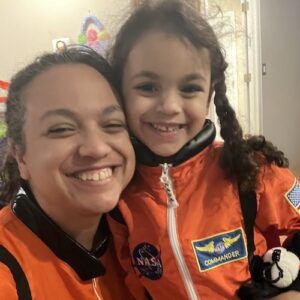
Carlie Neiswanger, PhD, is a Weill Neurohub Postdoctoral Fellow in the Heshmati Lab. Dr. Neiswanger’s research interests focus on understanding how chronic pain influences emergence and discovery from anesthesia using behavioral assays, machine learning-based quantification, chemogenetics, and calcium imaging. Her long-term goal is to build a lab with a research program focused on the interaction of pain states, neuropsychiatric disorders, and anesthetic outcomes. Dr. Neiswanger wants to engage in research encompassing the complex reality of patient care with refinement of preclinical studies to more readily translate basic science to bedside techniques.
Dr. Neiswanger earned a bachelor’s degree in Neuroscience and Psychology from Washington State University and a post-baccalaureate in Infectious Disease from the University of Georgia. She returned to the Pacific Northwest and the UW Department of Pharmacology to earn a PhD under the mentorship of Dr. Charles Chavkin. Dr. Neiswanger’s doctoral research in the Chavkin Lab focused on repurposing pharmaceuticals for the treatment of substance use disorder.
Having lived in the Pacific Northwest most of her life, Dr. Neiswanger never tires of being surrounded by mountains, water, and forest. “It’s the perfect place to explore just about any hobby (in or outdoors) that you could imagine.” She estimates she has collected at least 10 more such hobbies since moving back to Washington for graduate school. “It’s also really nice if you have a child who is a born explorer (or just mostly feral) like mine!”
October 2025
 Postdoctoral scholar Jingyi Chen is a Jane Coffin Childs Fellow in the Bruchas Lab. Dr. Chen’s research interests focus on unraveling the intricate neural mechanisms that underlie cognitive and behavioral flexibility at both molecular and circuit levels. This flexibility can arise from various factors, including an animal’s internal states (eg, age, sex, homeostasis, stress level, arousal level), past experiences (eg, learning and memory, sensor adaptation), or environmental contexts (eg, location and time). The brain must integrate multiple streams of information and execute precise, adaptive actions to effectively process sensory input and generate appropriate responses. Currently, Dr. Chen is studying neural mechanisms behind stress-induced binge-eating behaviors.
Postdoctoral scholar Jingyi Chen is a Jane Coffin Childs Fellow in the Bruchas Lab. Dr. Chen’s research interests focus on unraveling the intricate neural mechanisms that underlie cognitive and behavioral flexibility at both molecular and circuit levels. This flexibility can arise from various factors, including an animal’s internal states (eg, age, sex, homeostasis, stress level, arousal level), past experiences (eg, learning and memory, sensor adaptation), or environmental contexts (eg, location and time). The brain must integrate multiple streams of information and execute precise, adaptive actions to effectively process sensory input and generate appropriate responses. Currently, Dr. Chen is studying neural mechanisms behind stress-induced binge-eating behaviors.
Dr. Chen received her bachelor’s degree from Tsinghua University in China where she was initially admitted as a psychology major but switched to Chemistry when she decided to learn more about the biology and chemistry behind the human mind. She earned her PhD at Scripps Research Institute with Dr. Lisa Stowers. Dr. Chen joined the Bruchas Lab in 2021 and loves the collaborative community in the NAPE Center and at UW.
Outside of the lab, Dr. Chen has explored Seattle’s incredible dance community including ballet, modern, pole dance, and, most recently, traditional Chinese dance. Living in Seattle has truly nurtured Dr. Chen’s artistic side.
September 2025
 Meet Lena Johnson, MS, a Research Scientist and Lab Manager in the Tian Lab at the Mitochondria and Metabolism Center (MMC) at South Lake Union. We asked Lena a few questions for this feature.
Meet Lena Johnson, MS, a Research Scientist and Lab Manager in the Tian Lab at the Mitochondria and Metabolism Center (MMC) at South Lake Union. We asked Lena a few questions for this feature.
How did you get into this line of research?
During my Master’s work, I studied a novel RNA interference pathway and its role in maintaining genome integrity in the ciliate Tetrahymena. After graduating, I hoped to apply my knowledge and skills to studying human diseases. As someone whose favorite class in college was metabolic biochemistry, I’m really pleased to be working in a lab studying mitochondria and how metabolic dysfunction can cause or exacerbate heart disease.
What does your typical workday look like?
One thing I really like about my job is that the “typical” workday has a lot of variety. While I have lab management responsibilities, I also do experiments, as well as serve as the research scientist for the Seahorse instrument at the UW Diabetes Research Center’s Metabolic and Cellular Phenotyping Core. For example, depending on the day, I could be performing experiments; training a new Core user; updating and reviewing budgets, inventory spreadsheets, or mouse colony management, just to name a few. There is always something to do, which is great since I like to stay busy.
What has been your most significant accomplishment/finding?
Not sure I can answer this yet 😊 I’ve contributed experimentally to some current projects, but they are still in progress, and the results haven’t been fully analyzed and interpreted.
What’s your advice for others looking to get into this field?
For anyone interested in lab management specifically, I’d say it’s important to recognize and embrace the idea that your purpose is to support your lab members as well as you can. To me, this requires being responsive and approachable, making sure everyone has what they need for successful experiments, and stepping in to help perform experiments if needed. It also entails more behind-the-scenes responsibilities, such as making an effort to understand the ins and outs of procurement to spend funds as responsibly as possible, keeping up with lab equipment maintenance, and staying compliant with our various regulatory bodies such as EH&S, IACUC, and the DEA, so that there is no disruption of work.
One thing that people don’t know about you that you would like to share.
I love reading Golden Age detective fiction, in part because it removes the prospect of pesky scientific and technological advancements from a good whodunnit plot. I also enjoy observing how much human societies have (and haven’t!) changed over the decades since their publishing. My favorite authors in this genre are Ngaio Marsh, Seishi Yokomizo, Christianna Brand, and Arthur Conan Doyle.
August 2025

Kentaro Ishii, MS, PhD, is an Acting Instructor and member of Dr. Garret Stuber’s lab at the NAPE Center. Dr. Ishii studies brain-wide circuit mechanisms that underlie behavioral, motivational, emotional, and physiological state transitions triggered by external stimuli. His goal is to understand how brain-wide neural ensembles encode dynamic internal states—such as motivation, desire, or discomfort—and how these representations are disrupted in disorders like addiction or depression. Technically, he aims to integrate whole-brain circuit and neural ensemble analysis to generate comprehensive maps of functional brain states. Career-wise, he aspires to lead an independent research program that continues this work and fosters interdisciplinary training for the next generation of neuroscientists.
Dr. Ishii came to UW for postdoctoral training after completing his graduate studies at the University of Tokyo. Dr. Ishii’s PhD research focused on pheromone-evoked social and sexual behaviors in mice. The Stuber Lab and NAPE researchers offered an opportunity to study systems-level brain circuit mapping, while also embracing technological innovation in imaging and analysis. The collaborative culture and access to world-class mentorship were key factors in his decision to come to UW and continue to be a favorite feature of working at UW.
On a personal level, Dr. Ishii loves everything about the Pacific Northwest except rent. He fishes, gardens, cooks ramen, and plays fighting games competitively in his free time.
July 2025
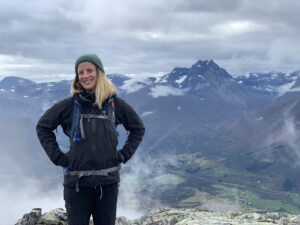
Karen “Kya” Sverdrup, PhD, a researcher at the Norwegian National Centre for Ageing and Health, is a visiting scholar in Dr. Kushang Patel’s Pain, Aging, and Physical Activity Lab. Dr. Sverdrup’s research focuses on device-measured physical activity in older adults and individuals with pre-dementia syndromes and dementia. She joined the Patel Lab in January 2025 to further her expertise in the epidemiology of pain, implementation and intervention research, and non-pharmacologic treatments aimed at improving pain management in older adults.
Dr. Sverdrup earned a Bachelor of Science in Physical Therapy from Oslo Metropolitan University in 2011, followed by a Master’s in Applied Social Sciences, International Social Welfare and Health Policy in 2016. In 2022, she completed her PhD at the University of Oslo.
Dr. Sverdrup’s long-term research goal is to promote health equity for older adults and enhance our understanding of healthy aging through population-based research. She aims to influence policy development and guide interventions that improve health outcomes. Her career aspirations include building a robust and diverse research portfolio, securing grants, leading innovative projects, and fostering interdisciplinary collaborations. She values working in dynamic, collaborative environments that challenge her and offer meaningful responsibilities.
What Dr. Sverdrup enjoys most about working at APM is its inclusive and collaborative community. She has appreciated learning about the various projects underway in the Patel Lab and finds inspiration in the team’s dedication to advancing research in the field. And yes—she’s also a fan of the stunning views from the 14th-floor office!
Outside of work, Dr. Sverdrup loves traveling and spending time outdoors—hiking, biking, skiing, and snorkeling/diving with friends. When the weather turns, she enjoys knitting, practicing yoga, and embracing the invigorating contrast of a hot sauna followed by a cold plunge in natural waters. So far, Seattle and its surroundings have exceeded her expectations, and she’s excited for the adventures and opportunities the summer season will bring.
March 2025
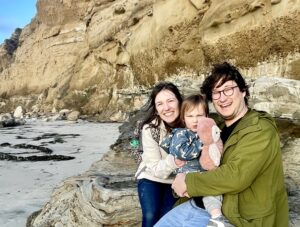
Jacob Gross, MD MPH is an Assistant Professor in the Department of Anesthesiology & Pain Medicine and Director of UW TelePain. Dr. Gross attended The University of Michigan for his undergraduate degree, followed by medical school at the University of Texas Medical School at Houston, his hometown. During his medical school training he also obtained a Master of Public Health with a focus on Healthcare Policy. He completed anesthesia residency and Pain fellowship here at the University of Washington. His training experience at UW inspired him to return as faculty to collaborate with talented colleagues, teach, and engage in unique opportunities in the Pacific Northwest.
His current research interests focus on expanding access to high-quality pain management through novel clinic models, provider education, and technology. As Director of UW TelePain and the Pain and Opioid Consult Hotline he leads weekly didactic sessions open to all community providers to improve their knowledge and confidence in treating complex chronic pain. Dr. Gross and the TelePain team are recent recipients of a Health Resources and Services Administration (HRSA) Technology-Enabled Collaborative Learning Program grant to facilitate the expansion of the UW TelePain program. The focus of this five-year award involves expanding UW TelePain further into the WWAMI region, connecting pain specialists with primary care providers in rural, frontier, tribal, and underserved areas, improving access to specialty pain care.
Dr. Gross’ long-term goal is to reimagine the fundamentals of pain medicine practice and education by developing alternative clinical models that integrate interdisciplinary approaches to pain care with cutting edge treatments and technologies. He hopes to expand the TelePain program and Pain and Opioid Consult Hotline nationally, providing an extensive asynchronous curriculum to support clinicians across the country.
Outside of work, Dr. Gross enjoys exploring the Pacific Northwest with his family. He loves aimlessly riding the ferry, visiting local parks and has recently taken up ice hockey.
January 2025
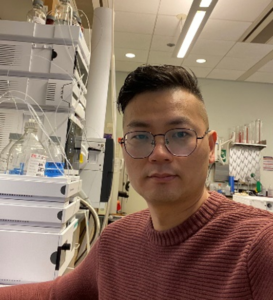
Acting Assistant Professor Wentao Zhu, PhD, is a member of the Northwest Metabolomics Research Center (NWMRC), directed by Dr. Daniel Raftery, at the Mitochondria and Metabolism Center (MMC) at the South Lake Union campus. Dr. Zhu is developing advanced metabolomics methodologies and building comprehensive databases to improve metabolite annotation. His research focuses on investigating metabolic changes that result from heart disease, cancer and other diseases and enhancing clinical diagnostic capabilities.
Dr. Zhu received his PhD from China Agriculture University and completed his postdoctoral fellowship and training at the University of Regensburg in Germany, where he received systematic training in metabolomics. Dr. Zhu spent 10 years as a faculty member at China Agriculture University in Beijing researching environmental toxicology and health.
Dr. Zhu recently completed an innovative project leveraging metabolomics techniques to define the metabolic response to synergistic drug interactions in cancer therapy. This research involved a detailed analysis of metabolic and lipidomic changes in MCF-7 breast cancer cells under stress conditions. By exposing the cells to low-glucose environments and inhibiting Stearoyl-CoA Desaturase 1 (SCD1) using a new drug candidate A939572, Dr. Zhu uncovered significant disruptions in cancer metabolic plasticity and growth. The study provided key insights into alterations in metabolic pathways and lipid profiles, offering valuable information for potential therapeutic strategies.
Currently, Dr. Zhu is conducting a comprehensive metabolomics investigation into the molecular mechanisms of a specific protein in a mouse model of heart failure. This project seeks to unravel the regulatory roles of the protein and its involvement in the pathological processes of cardiovascular diseases. Using state-of-the-art metabolomics approaches, Dr. Zhu aims to uncover critical mechanistic insights into the pathways affected by this protein and their implications for heart failure. The findings from this research have the potential to drive the development of novel therapeutic strategies for treating cardiovascular disorders.
Outside the laboratory, Dr. Zhu enjoys hiking, playing and watching soccer, and embracing the outdoors with his family whenever possible.

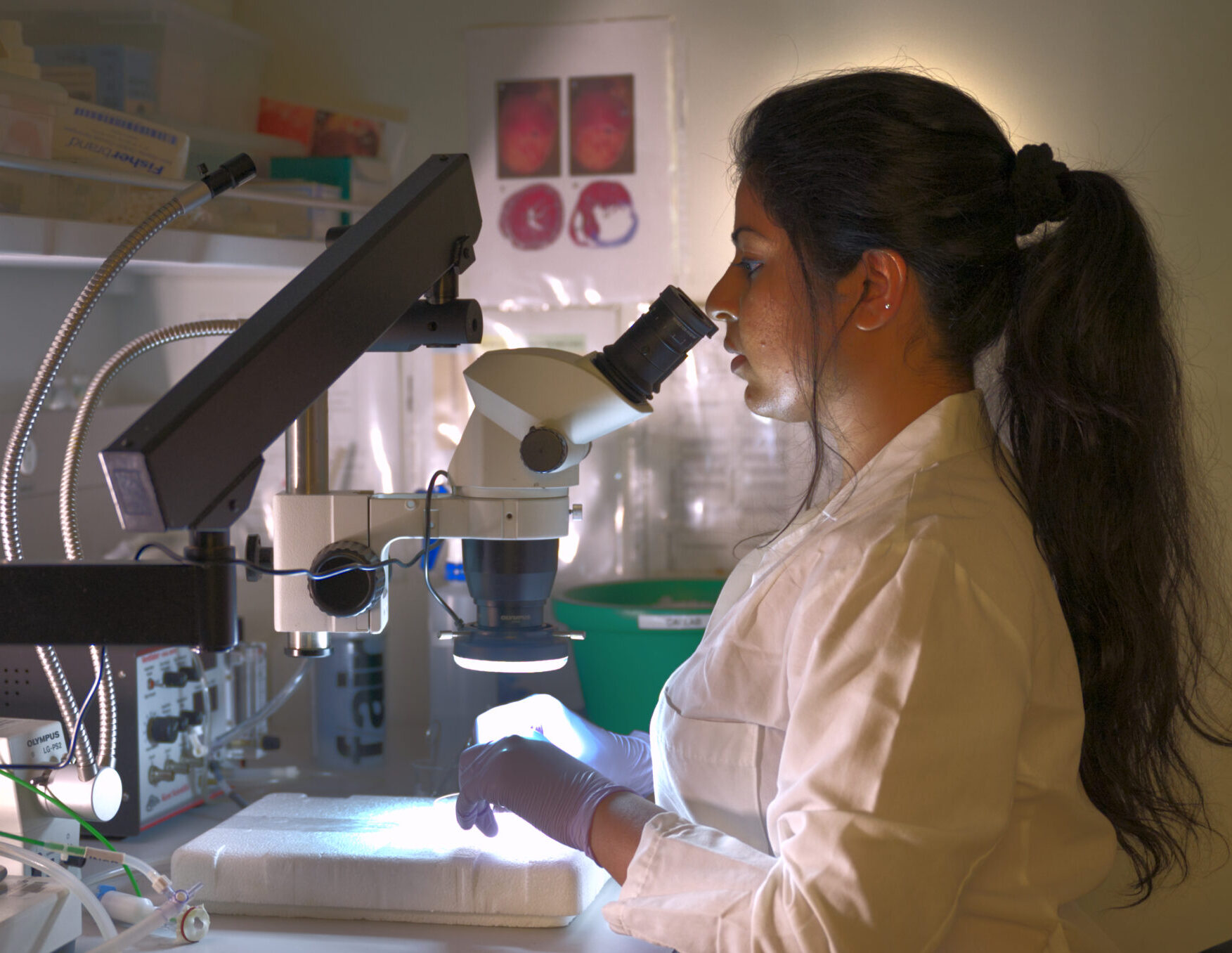

 Postdoctoral scholar Jingyi Chen is a Jane Coffin Childs Fellow in the Bruchas Lab. Dr. Chen’s research interests focus on unraveling the intricate neural mechanisms that underlie cognitive and behavioral flexibility at both molecular and circuit levels. This flexibility can arise from various factors, including an animal’s internal states (eg, age, sex, homeostasis, stress level, arousal level), past experiences (eg, learning and memory, sensor adaptation), or environmental contexts (eg, location and time). The brain must integrate multiple streams of information and execute precise, adaptive actions to effectively process sensory input and generate appropriate responses. Currently, Dr. Chen is studying neural mechanisms behind stress-induced binge-eating behaviors.
Postdoctoral scholar Jingyi Chen is a Jane Coffin Childs Fellow in the Bruchas Lab. Dr. Chen’s research interests focus on unraveling the intricate neural mechanisms that underlie cognitive and behavioral flexibility at both molecular and circuit levels. This flexibility can arise from various factors, including an animal’s internal states (eg, age, sex, homeostasis, stress level, arousal level), past experiences (eg, learning and memory, sensor adaptation), or environmental contexts (eg, location and time). The brain must integrate multiple streams of information and execute precise, adaptive actions to effectively process sensory input and generate appropriate responses. Currently, Dr. Chen is studying neural mechanisms behind stress-induced binge-eating behaviors.  Meet Lena Johnson, MS, a Research Scientist and Lab Manager in the Tian Lab at the Mitochondria and Metabolism Center (MMC) at South Lake Union. We asked Lena a few questions for this feature.
Meet Lena Johnson, MS, a Research Scientist and Lab Manager in the Tian Lab at the Mitochondria and Metabolism Center (MMC) at South Lake Union. We asked Lena a few questions for this feature.


